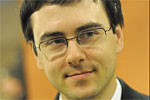


 By
GM Bartlomiej Macieja
By
GM Bartlomiej MaciejaThe recent FIDE announcement regarding the K-factor came to me as a huge surprise.
First of all, during the FIDE Congress in Dresden, the General Assembly decided to increase the value of the K-factor to K=20 (K=30 for players who have never reached 2400). The decision cannot be now challenged neither by the Deputy President nor by the General Secretary, even if the action is approved by the FIDE President, as according to the Article 4.1 of the FIDE Statutes, the General Assembly, being the highest authority of FIDE, exercises the legislative power.
Moreover, the increase of the value of the K-factor has been recommended for already many years as a necessary correction to the system. For example, statistician Jeff Sonas proposed K=24 already in 2002. With four rating lists published per year, the increase of the value of the K-factor is essential, as I have proved in my report of and the extended notes on the FIDE Congress 2008. With six rating lists published per year, the necessity of the increase is not under any question. Even so conservative FIDE Titles and Ratings Regulations Committee mentioned in Dresden K=25. The Qualification Commission decreased the value to K=20 and passed it through the General Assembly, without any objection.
The higher value of the K-factor will make changes of rating quicker, but the effect is far exaggerated by many people. Only for young and very old players (or, to be more precise, for fast improving and fast regressing players) the change will have a serious effect – their ratings will closer correspond to their present level. But, is it bad? For the majority of players, the difference will not be significant in a long term, only fluctuations will increase, thus the players hoping to easily exceed 2800 may get disappointed – they will still need to increase their level.
The reasons of delay provided by Mr Makropoulos and Mr Leong are far not convincing. Instead of waiting for a year or two in order to show consequences of the change of the value of the K-factor, it is much better and faster to calculate results from last two or even five years using the new value of the K-factor. As tournament reports are in electronic format, it is almost as easy for FIDE to recalculate everything as one click.
To judge how serious the argument with organisers and invitations sent in advance is, let's look at tennis. The basic rule of the ATP Ranking System is that players lose ranking points gained more than a year earlier. It means that the organisers encounter much bigger problems than in chess, because an invited leader of the ATP ranking list may be even almost unrated the following year, which is not the case in chess. However, the practice shows that it doesn't effect tennis tournaments, which are organised smoothly.
Taking into account the formal reason (decisions taken by General Assembly cannot be challenged) and also that an increase of the K-factor is absolutely neccessary from the statistical point of view, I call the Deputy President and the General Secretary of FIDE to withdraw their announcement and to follow the decision of the GA.
Best regards
Bartlomiej Macieja
28th of April 2009